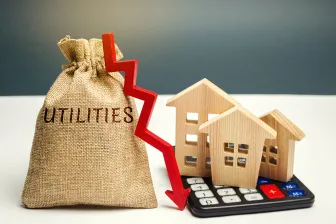Utility bills frequently disrupt our monthly budget. Utility bills are inevitable and often leave us wondering how to manage them. Smarter management of utility bills is more important than ever, especially with the rising cost of energy and water. There are simple hacks anyone can use to control their spending.
Imagine receiving your monthly bill without stress and dread, knowing that you made smart choices to save money while conserving resources. It is possible to reduce utility costs by reducing energy usage and leveraging smart technologies. We’ll dive into some practical tips and strategies to help you manage your utility expenses more effectively.
The Importance of Efficient Utility Bill Management
It is important to manage utility bills efficiently, whether you are a household or a business. This helps maintain a budget and keep expenses predictable. When you manage your bills well, it becomes easier to identify patterns in energy and water consumption. This knowledge can help you make smarter choices when it comes to your consumption habits. These adjustments will help you save money and improve the environment.
Understanding your utility bills will also help you spot errors or discrepancies quickly. Being proactive will help you avoid unnecessary overpayments. Every penny counts in today’s economy. Managing utility costs efficiently allows you to focus on other priorities, such as saving, investing, or just enjoying your life without worrying about increasing expenses.
Tips to Reduce Energy Consumption & Bills
It’s not difficult to reduce energy consumption. Switch out your incandescent bulbs with LEDs. They are more durable and consume less energy. Then, look closely at your appliances. Unplug appliances when not in use. Phantom load is the term used to describe how many electronics continue to draw power even after they are turned off.
Adjust your thermostat slightly. You can save a lot of money by adjusting your thermostat a few degrees. Set it down in winter while wearing warm clothes; raise it slightly during the summer and use fans instead of AC. Insulation is important! Insulating your doors and windows properly can help keep the heated or cooled indoor air, which reduces the demand on your HVAC unit. Install low-flow fixtures or take shorter showers to limit hot water consumption. These small changes add up to significant savings over time.
Water Conservation and Lower Water Bills
Home is where water conservation begins. Simple adjustments can significantly reduce water bills.
Check for leaks first in the toilets and faucets. Over time, even a small leak can waste hundreds of gallons. It is easy to reduce costs by addressing these problems promptly. Consider installing low-flow fittings. Showerheads and faucet aerators can reduce water consumption without sacrificing comfort or pressure.
Be strategic when it comes to watering your garden. To minimize evaporation, water your garden in the early morning or evening. Mulch around plants will retain moisture and help reduce the frequency of watering. Rainwater can be collected in barrels and used for gardening. This will not only save precious resources but also reduce your reliance on municipal services during dry spells. The small changes can quickly add up to a sustainable lifestyle and keep your bills in check.
Smart Technology Solutions for Utility Bill Management
Smart technology has revolutionized the way we pay our utility bills. These tools, from smart thermostats and energy monitoring apps to tracking usage and reducing costs, are easier to use than ever. Smart thermostats learn your habits. It can adjust the temperature according to whether you are at home or away. This technique saves energy without sacrificing comfort. You can also control it remotely via your smartphone.
Energy monitoring devices can analyze consumption patterns in real time. You can make informed decisions on how to improve efficiency and reduce power consumption by identifying the appliances that use the most energy. Smart fixtures that save water are also becoming more popular. These devices monitor the flow of water and detect leaks in advance before they can cause damage or increase your bill. Integrating these technologies allows for a holistic approach to utility management. You can control your comfort and your costs with just a few clicks of your smartphone.
Negotiating with Utility Companies to Get Better Rates
Negotiating with utility companies may seem intimidating but can result in significant savings. Compare your current plan with those of competitors. In these discussions, knowledge is key. Be friendly but firm when you call. Be clear about your problem, whether it is financial stress or dissatisfaction with services. If you approach them positively, utility representatives will often be more willing to assist.
Inquire about any hidden discounts or promotions. Many companies offer specials for their loyal customers or have programs for households with low income. Ask about possible rate reductions for long-term customers or those who have recently changed service plans. Request to speak to a supervisor if the representative does not provide satisfactory answers. A supervisor may be able to negotiate lower rates on your behalf.
Conclusion
Managing utility bills doesn’t have to overwhelm you. You can control your costs and make wise choices with the right approach. Energy-efficient tools and habits can help you save money. Over time, every small change can add up to a significant difference in your monthly bill. You should also monitor your water usage. Fixing leaks and using low-flow fixtures are simple ways to reduce costs.
Smart devices can help you manage your consumption more effectively. Savings from these innovations can often cover the cost of the innovation. Another important step is to engage with utility companies. Negotiating rates and exploring programs available could result in better deals tailored to meet your needs. These strategies can help you to manage your budget and contribute positively to the sustainability effort.
FAQs
1. What are the factors that affect my utility bill?
The size of your house, the quality of insulation, the number of occupants, and the appliances you use all affect your utility bills. The seasons also affect energy consumption.
2. How can I track the energy and water consumption of my home?
You can track your consumption with online tools and apps from many utilities. Smart meters and home energy monitors can provide you with real-time information on your usage.
3. When are electricity rates lower?
Yes! There are many providers who offer time-of-use pricing, where the rates change based on how much energy is used throughout the day. You can save money by using high-energy appliances at off-peak times.
4. Can I negotiate with my utility company to get better rates?
Absolutely! Many utility companies offer programs to help customers in financial difficulty or who want discounts for loyalty and timely payments.




